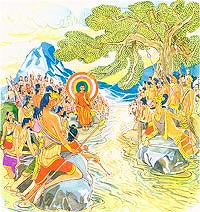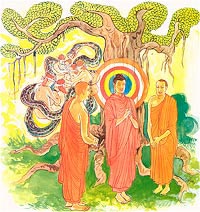11 06 2012 MONDAYLESSON 633 FREE ONLINE eNālāndā Research And Practice UNIVERSITY And THE BUDDHISTONLINE GOOD NEWS LETTER by ABHIDHAMMA RAKKHITA through http://sarvajan.ambedkar.org
Dhammapada: Verses and Stories Dhammapada-Natikalahavupasamana Vatthu-
Happiness-
Without Sickness Among The Sick-
Anxious Among The Anxious

Verse 197. Happiness
We the unhating live
happily midst the haters,
among the hating humans
from hatred dwell we free.
Explanation: Among those who hate, we live without hating,
When they hate we live without hating, We live happily among those
who hate.
 |
Verse 198. Without Sickness Among The Sick
Explanation: Among those sick, afflicted by defilements, we, |
 |
Verse 199. Not Anxious Among The Anxious
Explanation: Among the anxious men and women, who ceaselessly |
Dhammapada Verses 197, 198 and 199
Natikalahavupasamana VatthuSusukham vata jivama
verinesu averino
verinesu manussesu
viharama averino.Susukham vata jivama
aturesu1 anatura
aturesu manussesu
viharama anatura.Susukham vata jivama
ussukesu anussuka
ussukesu manussesu
viharama anussuka.Verse 197: Indeed we live very happily, not hating anyone among those who
hate; among men who hate we live without hating anyone.Verse 198: Indeed we live very happily, in good health among the ailing;
among men who are ailing we live in good health.Verse 199: Indeed we live very happily, not striving (for sensual pleasures)
among these who strive (for them); among those who strive (for them) we live
without striving.
1. aturesu/atura: ailing or ailment; moral ailment is meant here.
The Story of the Pacification of the Relatives of the Buddha
The Buddha uttered Verse (197) to (199) of this book, in the Sakyan country,
with reference to his relatives who were quarrelling over the use of the water
from the Rohini river.Kapilavatthu the town of the Sakyans and Koliya the town of the Kolyans were
situated on either side of the Rohini river. The cultivators of both towns
worked the fields watered by the Rohini river. One year, they did not have
enough rain and finding that the paddy and other crops were beginning to shrivel
up, cultivators on both sides wanted to divert the water from the Rohini river
to their own fields. Those living in Koliya said that there was not enough water
in the river for both sides, and that if only they could channel the water just
once more to their fields that would be enough for the paddy to mature and
ripen. On the other hand, people from Kapilavatthu argued that, in that case,
they would be denied the use of the water and their crops would surely fail, and
they would be compelled to buy from other people. They said that they were not
prepared to go carrying their money and valuables to the opposite bank of the
river in exchange for food.Both sides wanted the water for their own use only and there was much ill
will between them due to abusive language and accusations on both sides. The
quarrel that started between the cultivators came to the ears of the ministers
concerned, and they reported the matter to their respective rulers, and both
sides prepared to go to war.The Buddha, surveying the world with his supernormal powers, saw his
relatives on both sides of the river coming out to meet in battle and he decided
to stop them. All alone, he went to them by going through the sky, and stopped
immediately above the middle of the river. His relatives seeing him, powerfully
and yet peacefully sitting above them in the sky, hid aside all their weapons
and paid obeisance to the Buddha. Then, the Buddha said to them, “For
the sake of some water, which is of little value, you should not destroy your
lives which are of so much value and priceless. Why have you taken this stupid
action? If I had not stopped you today, your blood would have been flowing like
a river by now. You live hating your enemies, but I have none to hate; you are
ailing with moral defilements, but I am free from them; you are striving to have
sensual pleasures, but I do not strive for them.”Then the Buddha spoke in verse as follows:
Verse 197: Indeed we live very happily, not hating
anyone among those who hate; among men who hate we live without hating
anyone.Verse 198: Indeed we live very happily, in good
health among the ailing; among men who are ailing we live in good
health.Verse 199: Indeed we live very happily, not
striving (for sensual pleasures) among these who strive (for them);
among those who strive (for them) we live without striving.
At the end of the discourse many people attained Sotapatti Fruition.